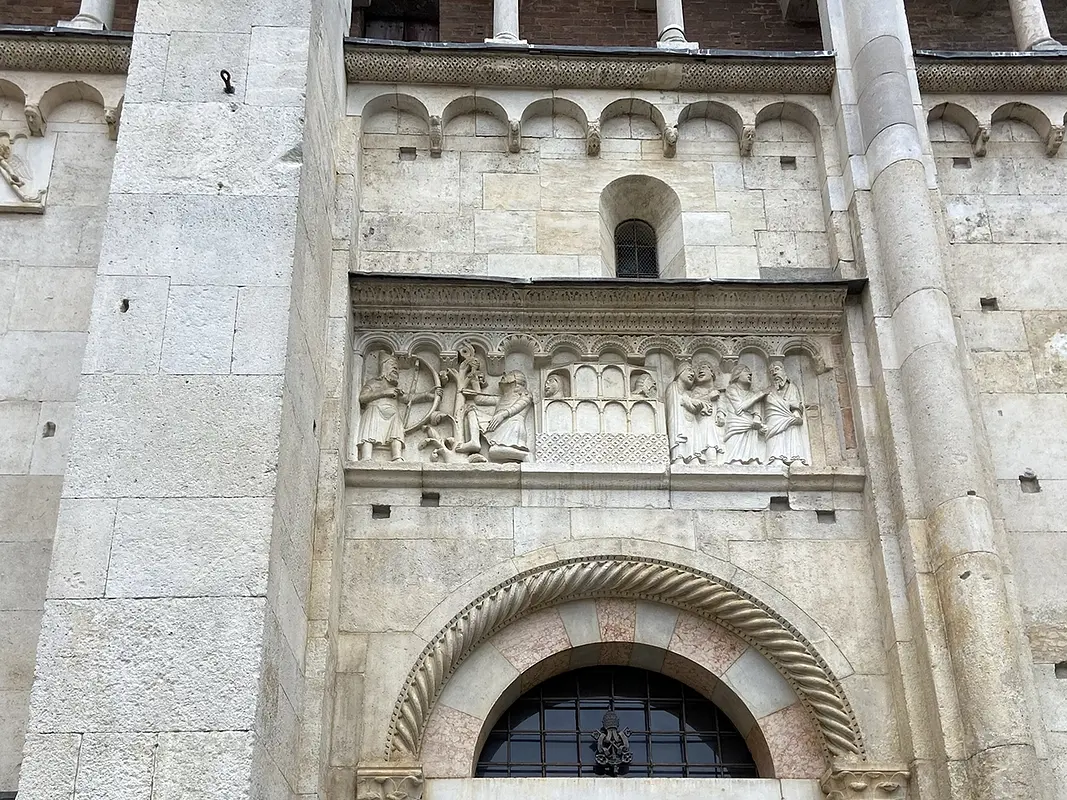SHARRYLAND


























Modena Cathedral, poetry carved in stone
A fantastic bestiary, legends and fairy tales are accompanied by stories from the Bible and Gospels


Where is

What it is and where it is
Modena Cathedral is Romanesque in style, as conceived by architect Lanfranco and sculptor Wiligelmo, with some Gothic elements introduced by the Campionesi builders. It was so admired that it served as a model for all other cathedrals in the Po Valley. It has been a UNESCO heritage site since 1997 . The exterior is dizzying, impossible in this space to describe in detail, but the sculptures with which the church is populated sum up the whole world of medieval man, work, fears, hopes, fantasies.
Why it is special: the incredible sculptures of the exterior...
At the entrance, under the prothyrum, a vegetal tangle, almost a forest, populated with monstrous beings representing sin, on the left the stories of Adam and Eve, on the right those of Cain and Abel and the Universal Flood, and above the beautiful rose window by the Maestri Campionesi. On the south side are the Porta Regia, by the Campionesi and the Porta dei Principi, with the stories of St. Geminianus, from the workshop of Wiligelmo. A Renaissance pulpit and bas-relief follow....of the apses and north side.
At the rear are the three apses and a splendid view of the Ghirlandina, the magnificent bell tower. On the north side is the Fish Market Gate, from the school of Wiligelmus, with unusual stories of King Arthur and the Knights of the Round Table, animals from Aesop and Phaedrus, and months in the interior jambs.
Fun fact: a daring detail
On the south side, if you look up you will discover more sculptures in the metopes that continue the pilasters. They are young men in contortionist poses. One of them is very curious: it is a seated hermaphrodite with spread legs, with the "jewels" perfectly in view although not too legible due to blows from blunderbusses received in the 1500s because of its obscenity. Hermaphrodites in the Middle Ages were seen as monstrous, which explains the depiction here as part of the medieval bestiary.
Not to be missed: the wonders of the interior
The interior, majestic, of exposed brick, with three naves, supported by pillars alternating with columns, concluded by a raised chancel, covered by cross vaults, is a concentration of masterpieces. The most striking is the pier, with its powerful bas-reliefs on the Passion stories; it is believed to be the work of Anselmo da Campione, although more recent critics place it further back in time. It is supported by mighty stylobal lions and fantastic capitals, and ends in a circular ambo. Above, an elegant marble enclosure of slender columns surrounds the altar. Below is the crypt.
The terracottas of the cathedral
Before leaving, not to be missed are two works: the grand terracotta polyptych, with stories of Mary and Jesus, by a pupil of Ghiberti, and the beautiful nativity scene also in terracotta, by Antonio Begarelli, a sculptor from Modena.
A bit of history
For Modena Cathedral the best skills of the time, the mysterious Lanfranco and the great Wiligelmo, were put together . They were joined a century later by the Maestri Campionesi. And it was Masterpiece. Begun in 1099 under the leadership of Lanfranco and Wiligelmo, the Romanesque Duomo was continued and partly modified in the early 1200s by the Maestri Campionesi, sculptors from northern Lombardy, who gave it a Gothic imprint. The Ghirlandina, begun together with the Duomo, was finished with the spire in 1319.
Enter the Map of Italy's Undiscovered Wonders and find treasures where you least expect it... Inspire, Recommend, Share...
Contact
Collections
The Map thanks:
In the Community
Enter the Map of Italy's Undiscovered Wonders and find treasures where you least expect it... Inspire, Recommend, Share...
Where is

Contact
Collections

